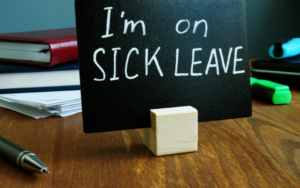 State benefits like Statutory Sick Pay (SSP) can be a little more complex than it seems at first and often people presume that it will pay more than it actually does. Here we simplify how statutory sick pay benefits work, the various rules and eligibility criteria as well as what happens when it runs out.
State benefits like Statutory Sick Pay (SSP) can be a little more complex than it seems at first and often people presume that it will pay more than it actually does. Here we simplify how statutory sick pay benefits work, the various rules and eligibility criteria as well as what happens when it runs out.
What is Statutory Sick Pay (SSP)?
Statutory sick pay - often simply referred to as SSP - is the state benefit that provides an income for employees who are incapacitated to work. It replaces lost income and supports your employer to pay you the minimum amount set out by the government.
Your employer can pay you more than what is available through statutory sick pay but they must pay you at least the minimum amount if you are eligible.
When can statutory sick pay be claimed?
You can claim SSP from the fourth day of being unfit to work (including non-working days).
You must notify your employer within 7 days of the first day of your incapacity to work or within the period set out by your employer in your employment contract.
Who is eligible for statutory sick pay?
Not everyone will be entitled to SSP but you should be able to claim SSP if you:
- are an employee
- have carried out work for your employer
- have earned a minimum of £123 per week on average
How much statutory sick pay can I claim?
The amount of income your employer can pay you (using statutory sick pay provisions) is updated each financial year. For the period 2024/25 the amount of SSP a person can claim is £116.75 per week. If you meet the eligibility criteria, this is the minimum amount that your employer will pay you whilst you are off sick for up to 28 weeks.
You will be paid for your normally working days that you are unable to work except for the first 3 days that you were absent due to incapacity.
The amount paid through statutory sick pay has remained extremely low in comparison to the average cost of living across the UK.
The Office of National Statistics (ONS) shows that an average household in the UK spent £528.80 per week between April 2021 and March 2022, however, this doesn't take into account the recent rise in the cost of living and the latest inflation figures.
The following is a broad summary of the average weekly spending in the UK which varies across the country. What becomes clear is that if you rely solely on SSP if you become ill and are not paid by your employer, you are unlikely to be able to afford your cost of living.
UK average weekly cost of living
| Living expense | Weekly average household cost |
| Housing | £67.70 |
| Food and drink | £63.50 |
| Gas and electricity | £37.10 |
| Holidays and recreation | £65.40 |
| Restaurants and hotels | £40.50 |
| Clothing and footwear | £16.80 |
| Water | £10.70 |
| Household goods and services | £35.50 |
| Transport | £79.20 |
| Phone and broadband | £20.30 |
| Insurance, personal care, social protection | £40.30 |
| Health | £8.90 |
| Education | £5.10 |
| Tobacco and Alcohol | £10.80 |
| Other expenses such as licences, fines, transfers, mortgage interest | £75.70 |
| Total average weekly household spend | £577.50 |
Source: www.ons.gov.uk based on the financial year ending 2023
Is statutory sick pay taxable?
Yes, income tax and national insurance contributions apply to statutory sick pay. In reality, though, they are rarely applied because SSP at £116.75 per week falls below the thresholds for both.
- National insurance contributions apply to earnings over £242 per week
- Income tax is payable at earnings over £242 per week
How long will statutory sick pay continue to be paid?
If you claim statutory sick pay, it will continue for up to 28 weeks or until you are fit to work - whichever happens first.
It is also worth noting that a period of absence due to incapacity, lasting at least 4 days in a row and that occurs within 8 weeks of a previous absence will be linked. If your linked periods of absence last 3 years or more, you'll no longer qualify for statutory sick pay.
What happens after statutory sick pay stops paying?
If you are unfit to work and have claimed the full amount of statutory sick pay payments, these will stop. You are limited to 28 weeks of statutory sick pay and after this period you would have to claim Employment and Support Allowance (ESA) if you were still unfit to work.
You can start the process of claiming ESA up to 3 months before you reach the end of your 28 weeks of SSP. The application can take time to verify and process.
You can find more information about ESA using this government webpage, "How to claim new style ESA"
Long-term incapacity to work
If your incapacity stretches beyond 28 weeks, statutory sick pay stops being paid. Some people may have become ineligible for SSP before 28 weeks if their employment contract was ended - it's a condition of SSP that you are employed.
If your incapacity continues beyond your employment contract or beyond the maximum payment period of 28 weeks, you can check if you are eligible for Employment Support Allowance. In some cases, you may also become eligible for universal credit.
Long-term disability allowance was replaced with Personal Independence Payment (PIP). This benefit supports those who are unable to fulfil certain tasks of daily life and can also evidence that this is likely to be the case for 9 months or more. You can read more about PIP on the government webpage, "PIP - Personal independence payments"
It's no secret that claiming state benefits for incapacity has become more difficult over the years and these benefits are open to review by successive governments.
A recent research piece published by the Trades Union Congress (TUC) suggests that 1 in 8 working age people will exit the workplace pre state retirement age due to accident, illness and/or disability.
What sickness benefits can I claim if I am self-employed?
Self-employed people can't claim statutory sick pay and would have to check eligibility for employment support allowance and/or universal credit. Deciding to take the self-employed route is usually tough, not least because you don't have the same employment protections in place. Besides the risks of failure in business, you must also consider the challenging situation you may face if you were to become ill or injured unexpectedly. Although there are other benefits available to you aside from statutory sick pay, it can be very difficult to navigate those benefits and the qualifying criteria.
You can read more about government support for those who are self-employed on the government webpage - "Employment support allowance"
If you are self-employed then it is wise to put some insurance in place to safeguard yourself against the unexpected. There are a number of personal insurances that will prevent hardship for you and your dependents if you become ill or injured resulting in lost income. You can read more about the different types of insurance in our article "Sick pay insurance guide"
How to enhance your SSP benefits
Personal sick pay insurance provides people with a tailored solution that will replace lost income if they suffer incapacity. You are able to insure up to 70% of your gross earnings, making it a far more generous and realistic level of support if you find yourself unfit to work. You can read more about this type of insurance in our article "Sick pay insurance guide"





